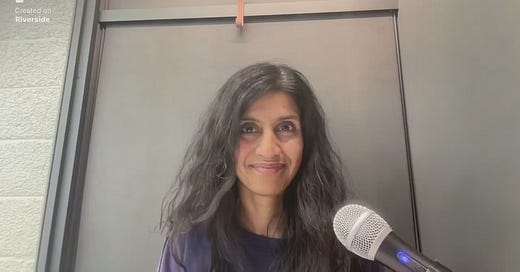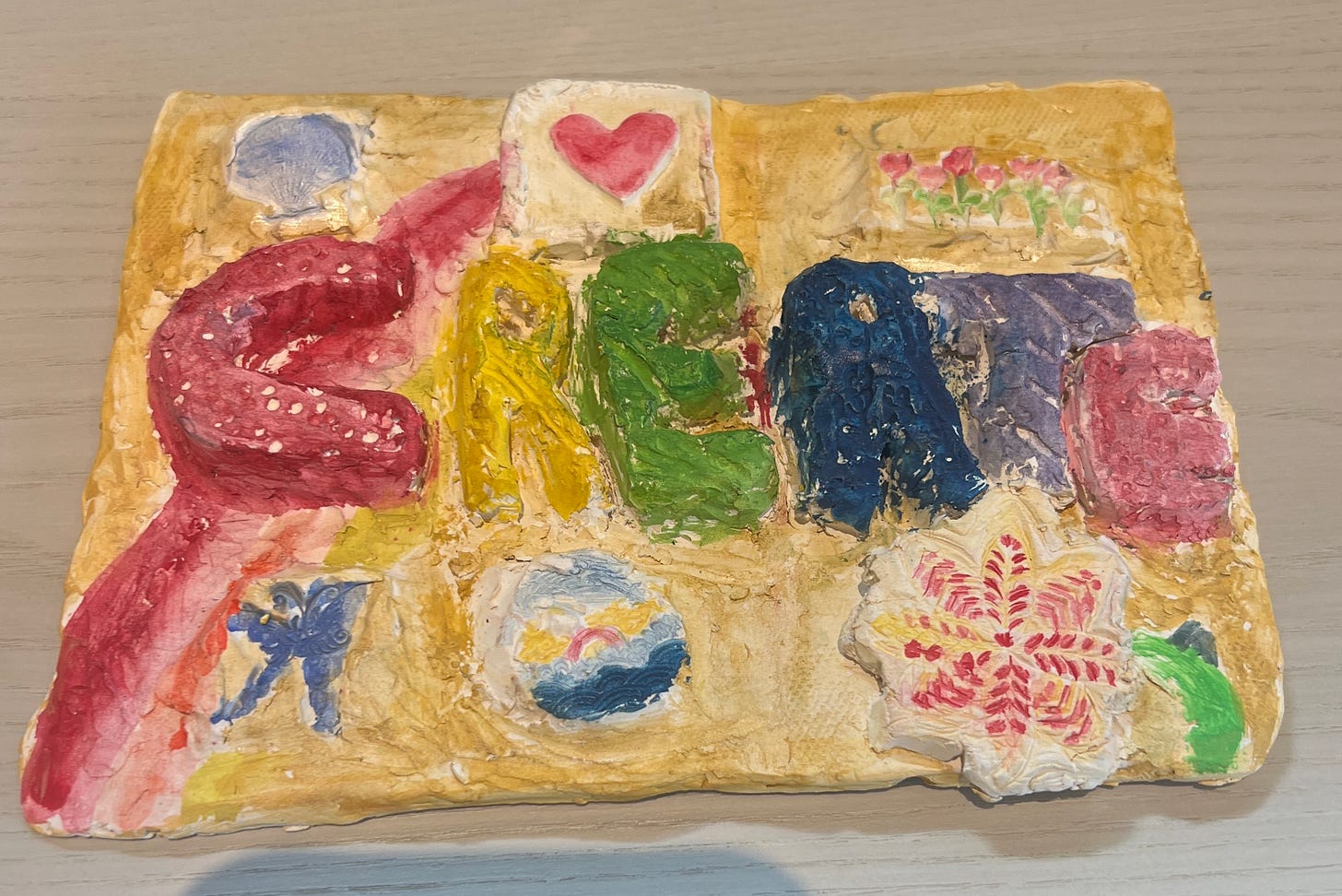Welcome to ✨ the space between✨ - the practical place where the currents of our technology and our humanity meet and mingle. Where we ask: what load needs help lightening, and what frictions are productive and need preserving?
My goal is simple: in 10 minutes or less, help you be the most informed on the impact of AI in the spaces you care about the most, so you can make the choices that are right for not only you, but your family and community.
“In the age of AI, what are parents for?”
You might think I’m asking a highly theoretical question but, as I’ve realized over the past 6 months since my TED curators posed this question to me, it’s a really relevant one even as it’s deeply uncomfortable.
In a not-too-distant future when AI will be able to do all of the work of being a parent - self driving cars for pick up and drop-offs, robots that do the laundry and the cooking and the cleaning, AI chatbots for tutoring and therapy…. what are we, the imperfect, fallible, impatient humans for?
Asking this question has led me down fascinating explorations - some exciting, some worrisome, all relevant. I focused less on the parenting parts and more on what my work building Milo has taught me about technology serving our families.
Where I landed for my 8 minute perspective covered only the most important bits:
We have on our hands the kind of technology that could conceivably do anything we would want it do - for us and for our kids.
In that kind of world, we need to be thoughtful about what we want it do.
We can’t use “friction” as a reliable measure and build products that make everything “smoother” - more convenient and productive
Because in human interactions, not all friction is bad - some is quite necessary and productive, which might be inefficient, but it creates strength and connection
We should get to choose what is most important to us and get the help we need, on our terms, based on what we value.
Which is all to say: yes we humans are imperfect and messy and incomplete. And yes we are building the kind of tool to end all tools that could make up for all of our short-comings.
Or we could look at it a different way:
That our deep imperfections are a feature, not a bug.
And instead of building tech that only seeks to make us more, maybe we can build tech that simply makes space for us to just be - finite and flawed.
You can watch the full talk here:
What started as a personal exploration for me, has been echoed in the questions that others have brought up to me since the talk.
Big questions like:
how can I know how to have my kids use AI well if I can’t stay on top of what’s happening?
what does AI safety mean anyway?
why do model hallucinations matter so much?
But also more practical ones like:
can the robots actually do the laundry?
can it solve the yearly summer camp nightmare?
where do I even start?
We’re all so busy and things are moving so fast that it’s hard to know where to dig in and what info to trust.
So each week I want to explore a little bite-size nugget at a time - give you the lay of the land, tell you your options and help you play your way to feeling informed.
To kick things off, next up will be:
💡 AI 101 - learn the basics and the latest things to check out
🤖 The robots are coming - general purpose household robots are closer than you might think.
-inconveniently yours,
avni
🕹️ Worth playing around with:
During a conversation with a friend, she mentioned she didn’t know where to start with any of the options out there.
Claude (Anthropic) or ChatGPT (OpenAI): if you haven’t already, I’d recommend starting here. Create a free account on the web or download the app.
I’ll dive into the practical differences between the companies and the models but for now - play around with both and get a sense for not only how they serve your requests, but more subtle things like tone, format and focus on the response.
where these chatbots really shine is anything more generative or brainstormy and then I double check any fact based details (esp for recipes, itineraries or tips)
words of caution: for anything fact-based, proceed with caution because of the tendency to confidently make things up
be aware of sharing any personal or confidential information - we’ll dive into how to do it and what the implications are, so you can do it confidently, but as you get started keep it vanilla.
Reaching into my chat history, here are a couple of the most recent questions I’ve asked Claude (some real range 😅):
Bonus: if you wanted to go deeper on the TED talk and my discovery around productive friction:
Building AI for parents has made me revaluate everything I thought I knew about building consumer products.
When I started my career at Procter & Gamble (maker of Tide, Pampers, Crest and countless other household brands), I honed my ability to see friction in the tiniest of everyday interactions and to build products that eliminated it.
I got really good at it.
So when I felt all this friction as a parent, I felt well equipped to go hunting for the inconveniences, the irritations, the frustrations and to create products that eliminated them.
But over the past decade I’ve been building for parents, I’ve had a gnawing feeling that I’ve been missing something. There have been many cases where I could absolutely build something that removed friction. But my intuition told me that wouldn’t lead to the ultimately desired outcome.
Take arranging playdates. It’s one of my greatest frustrations - having a bunch of text messages throughout the week to coordinate playdate times for my girls. I love that for them. I want them to spend time with friends and I love that parents are reaching out to find the time. (Tbh, I wish they all lived close enough and had schedules that allowed for them to just bike over and spontaneously hang out, but that’s another matter).
It’s just so time consuming and soul sucking - going into the calendar to find possible times and the back and forth until finally a time is found and that then needs to go back into the calendar.
I could totally build a machine where “my family AI could talk to your family AI” and just schedule the playdate and inform each party.
Simple, tidy, frictionless.
Only: that feels soulless. I actually like talking to the other parents, inefficient as it is. It’s the logistical bits I hate.
So where does that leave us?
We live in a world increasingly driven by machines that operate under north stars of productivity, efficiency and convenience. Make everything faster so we can do more, buy more, consume more.
But that doesn’t feel like the right north star in our personal lives. In our family lives.
And what I discovered, by way of my daughter’s clay art piece, surprised me - sometimes, the thing we think is full of friction is the thing creating the strength and the connection. And where people and just life are involved, so much that feels like friction is actually just the good bits of being alive and human.
It’s called: productive friction and we want to be reeeeally careful of what we go about removing in the name of ease, convenience and efficiency.
Removing the first order friction might feel better and seem rational, but the second and third order impacts are worse - as we’re seeing with social media and many other apps of convenience.
Is there another way?
What would it look like if instead, we let the first order thing be a bit frictionful, so that the 2nd and 3rd order impacts can be better.
Even though it’s not as obvious, I can keep my texting with the friends, but have the AI do the scheduling parts. I can find more time for a spontaneous neighbor walk at lunch, because I don’t have to review the sports emails and add dates to the calendar.
The point is, as I say in the talk: in AI, we finally have the kind of technology that can tell the difference between load that we need help lightening and work that is hard but is mine to do.
And in this future? Maybe the biggest prize is that we each just get to simply be: inconveniently human.












Share this post